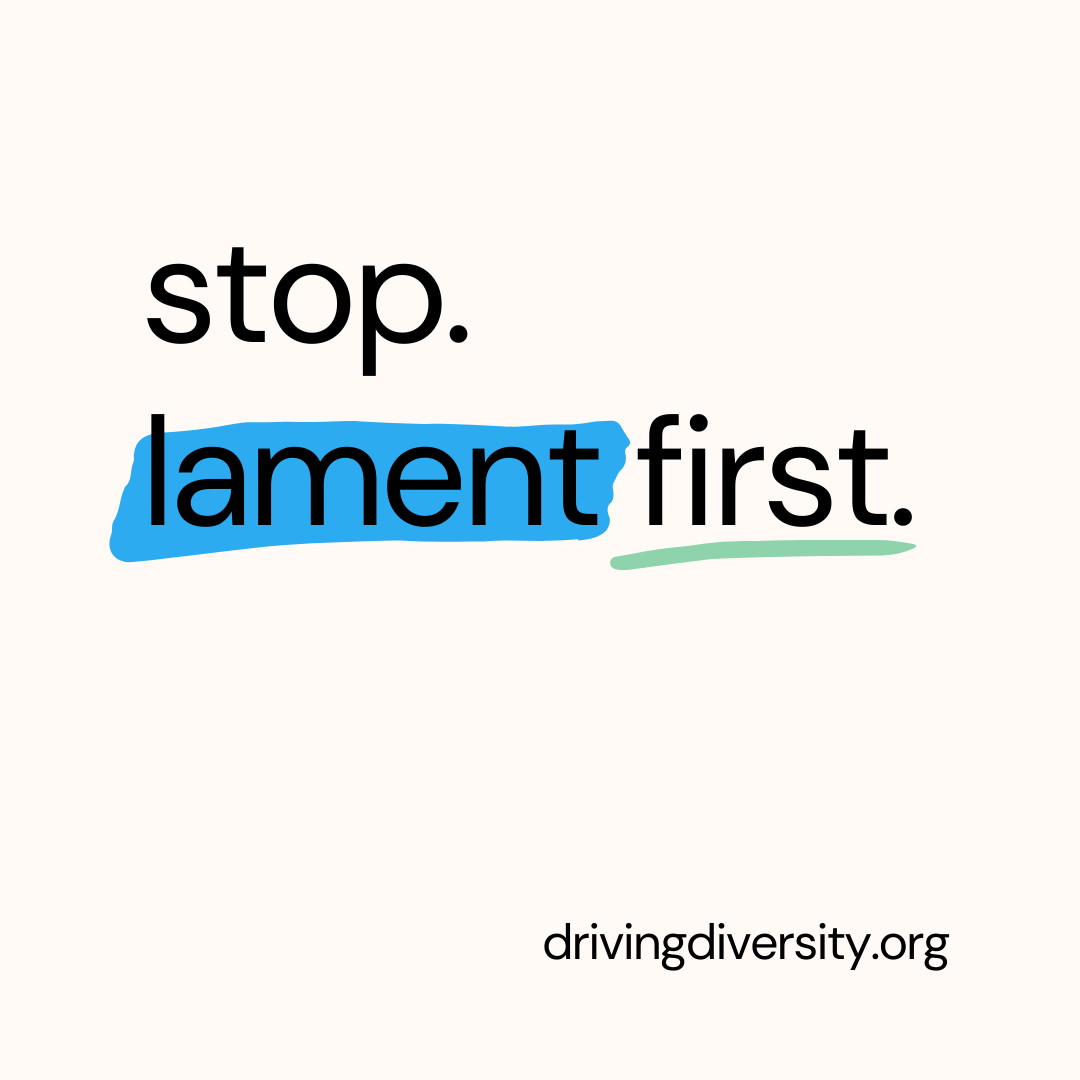 “What’s going on in our world? What’s happening? It seems to be coming apart at the seams.” These are some of the thoughts I hear from people these days. We see civil unrest, demonstrations, and riots. There is a lot of anger on all sides. How should the church respond? Should we jump in with the anger, the rhetoric, the violence? Should we strategize, problem solve, and work at finding solutions? Should we educate ourselves so that we better understand what’s going on? I think before we do anything, we need to stop and lament. A lament is a passionate expression of grief or sorrow. There is so much to grieve over--to mourn, to lament. We need to take the time, a lot of time, to properly lament before we even think about solutions. Why We Lament As the Diversity Director for a national campus ministry, I often find myself crying in prayer. I am entrusted with helping our movement accurately represent our Father and his kingdom through our ministry. This is a somewhat impossible task. The church has mostly failed at this task during most of its history. Yet, we still work at it because it is our purpose as God’s people to represent him—to bear his image in this world. I am compelled to pray and to work. The gravity of the work is not lost on me. I feel the burden of it each day. I see our failures and shortcomings. I listen to the experiences of students and staff from different ethnic groups. I know we can do better. All the time, I see the many ways we can be better image bearers, show the campus a more accurate Christ. And so, I cry. I lament. I mourn. Sometimes, I even wail. When my kids catch me crying in prayer and ask me about it, I tell them, “I’m sad. Crying is what we do when we’re sad.” When there is loss, trauma, injury, and wrongdoing, crying is the right thing to do. We should be brokenhearted over these things. It should make us feel. The Father feels. In Noah’s time, the Father “regretted that he had made human beings on the earth, and his heart was deeply troubled.” He “saw how great the wickedness of the human race had become on the earth, and that every inclination of the thoughts of the human heart was only evil all the time” and He mourned. The Bible is full of examples of God’s heart breaking over the wickedness of humans, over the injustices we perpetrated on each other. No, these are not new, but they are still wrong. If it hurts our God, it should hurt us as well. How can we say we are in fellowship with him, we are his children, if we are untouched by the things that touch him? What We Lament There is so much that needs lamenting that I cannot possibly do it justice in this short article. Here are just two thoughts. Take the time to think and pray through them and the Holy Spirit will bring to mind more areas that need your lament. Injustice. Justice is doing right. The wicked are condemned and the innocent are protected. Think about the history of our country in relation to African Americans, Native Americans, other ethnic groups and the poor. There is no doubt that these groups of people have not found justice in our society. From the time Europeans arrived on our shores, they have endured one injustice after another: enslavement, displacement, rape, murder, separation of families, physical abuse, torture, and dismemberment is not a complete list. Are these ethnic groups the only ones who have faced injustice? Of course not. Human beings and the systems they develop are inherently unjust. The amazing thing about our country for most of our history though, is that it has been assumed justice is primarily for Whites. For others to think they could or should have the same justice has been a foolish thought. God’s kingdom, on the other hand, is inherently just because God is the definition of justice. As citizens of his kingdom we love justice and hate injustice. Just the existence of injustice around us should break our hearts. Letting the suffering of others touch us and caring for their situations is core to the gospel. God became flesh and dwelt among us. He did not shy away from walking in the dirt of this world. He embraced our suffering. Are we not to do the same? Failure. As I mentioned before, the church has mostly failed at accurately representing our Father and his kingdom to the world. If you do not believe that, you need to study the Scriptures and history more. Most of the injustices listed above have been committed by those wearing the Christian banner, sometimes those wearing the missionary banner. We can say these individuals were not “real Christians” and separate ourselves from them like we try to do from the Crusaders and Conquistadores. But how is the world to know the difference if one group is publicly doing wrong in the name of Christ and the other is doing nothing. Of course, there are Christians we can point to in history who stood up for justice, believers like William Wilberforce, Harriet Tubman, and Martin Luther King Jr. But unfortunately, they are the minority, a part of the remnant who did not bow their knees to the idols of the time: greed, complacency, and fear. They chose courage over comfort and often paid with their lives. These are the exceptions. Where were all the other Bible-believing, Spirit-filled believers during these times? Huddled in a corner, disconnected from the world, fearing contamination? As a Pentecostal believer I don’t have to look far to identify our failures. Our movement was birthed in a revival in Los Angeles led by an African American preacher named William Seymour where those gathered were from multiple different socio-economic levels and ethnicities. For a moment we tasted of heaven as believers gathered together and affirmed that there is “there is neither Jew nor Gentile, neither slave nor free, nor is there male and female, for you are all one in Christ Jesus.” Unfortunately, it did not take long for division to arise along racial lines. Is this not something that should be lamented? When we as the church take a good look in the mirror, do we not see many ways we have been complicit with racism, ethnocentrism and white supremacy? lf you need examples of the last, just look at the pictures of Jesus with white skin and blue eyes in many churches’ stained glass or Sunday school materials. How to Lament Brokenness and humility are the words God spoke to me when I asked him four years ago, “what should the church be doing right now.” Brokenness is what happens when we look at all the evil, all the wrong, all the injustice in our world and we allow it to hurt us. We are broken with those who suffer. Humility is the posture we take as we embrace the reality that there is nothing in ourselves that we can do to bring about any change. When we are honest about our frailty and our failures, we find ourselves in place of utter humility. I believe the first way we need to lament is to repent. The main reason we have not moved on as a country or even in the church, is we have not truly repented. Every once in a while, when things happen that we cannot ignore or are hard to deny (though many still try to) we will talk about how we need move on. Many, even in the church, think the trick to moving on is to stop talking about it. If we just stopped talking about racism, it would go away. Where a Christian would get the idea that ignoring a sin causes its disappearance is beyond me. You can find no such pattern in the Scriptures. What you do find is God continually, persistently, relentlessly, sending prophet after prophet telling his people basically the same thing. “Stop worshipping idols. Stop oppressing the poor, widows, and foreigners. Do right. Keep the covenant you agreed to. Be the people you’re supposed to be, so the world knows what I am actually like.” We cannot “move on” until we admit the wrongs we have done in the past and the present. We have to humble ourselves and admit the sins of the church and the country because, as parts of both of them, we have the Biblical obligation to do so (see Daniel 9 for an example of this). We must also repent for our own biases and prejudices. I have an awfully hard time believing I’m the only one in the world with biases and prejudices. If we can be honest and vulnerable about our struggle with lust, greed, and other sins, why can’t we be honest about our struggle with prejudice? The world has made racism today’s unforgivable sin, but God does not recognize this. He offers forgiveness and deliverance from this sin, just like he does all others. Another way for us to repent is to listen. Truth is we are not very good at this. For most of our history, those facing injustice have gone unheard. Even in this time, so many have told me how they feel silenced. You may scoff at this statement as you see the world shouting. But there are many in the church that feel if they were to fully share their thoughts and feelings, even just their experiences with fellow believers they would be attacked. So, they remain silent. Listening, both personally and through articles and other media is the primary way the church needs to repent right now. Listening will open up our hearts towards brokenness and humility. Jeremiah the prophet was broken for his nation. He cared. He cried out, “Oh, that my head were a spring of water and my eyes a fountain of tears. I would weep and day and night for the slain of my people.” Weeping I find is a very appropriate way to lament. I do not mean to say if you are not crying, you do not care. But I do find that deep pain often produces tears. If I think about how we as believers have disappointed God and how this world is so wicked and corrupt, and how so many suffer in it, I often feel pain. I am not advocating the false production of tears, but for the genuine embracing of God’s heart for people. Jesus was once asked why his disciples were not participating in a time of fasting with other religious groups. His answer was simple, “I’m here, so it’s a time for rejoicing,” (my own paraphrase). But he did say the time would come when they would fast. Fasting in Scripture is associated with humility and mourning. We humble ourselves, deny ourselves, because it is a time to mourn. Now is a time to mourn and in place of feasting, we can fast. Isaiah 59 offers a beautiful picture of true fasting. “Is not this the kind of fasting I have chosen: to loose the chains of injustice and untie the cords of the yoke, to set the oppressed free and break every yoke? 7 Is it not to share your food with the hungry and to provide the poor wanderer with shelter-- when you see the naked, to clothe them, and not to turn away from your own flesh and blood? Fasting is an active work of lamentation that, as Isaiah 58 points out, will lead to other works. Yes, we need to stop and lament first. Then, we need to let our lamenting, continual and growing, be the foundation for true fasting. 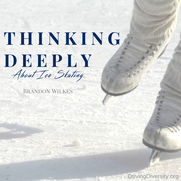 Last night I sat next to my daughter watching the figure skating competition for the Winter Olympics. We are not big figure skating fans, but she likes watching the competition, and I like making her feel nervous for the skaters as I shout “oh no don’t fall...” or “he’s going to drop her!” Not sure what that says about our relationship or me as a person, but it is so much fun. We also like to try to critique their outfits and guess their country. Most of the time, when guessing their country we are totally wrong because they are not usually wearing ethnic clothing and mostly all Europeans look....well, European. However, there was one skating pair that we both guessed correct without hesitation. It was a couple in which the man was white and the woman was black. We both at the same time shouted “France” and laughed. Why is it that we can see a black and white figure skating couple and know that they must be French and are sure that they are not American. America is the most diverse country in the world, but the thought that a black and white mixed race couple would be representing us in the Olympics was never a thought for a 43-year-old black man and his 13-year-old daughter. What is it about France that makes us think of it as a place where a mixed race couple on an ice skating team is normal? And why is it that a mixed race skating couple from France is normal? Not one commentator mentioned their race. If it had been an American couple we surely would have heard, “This is the first black woman to skate in a mixed pair Olympic competition.” In the early 20th century, France was a safe haven for many black people seeking equality. W.E.B. DuBois, Josephine Baker, and James Baldwin are a few famous African Americans who moved there, but there were also thousands of African American soldiers who moved there after WWII. They bought property, fell in love with French women, started businesses, and lived a normal life. Could it be that there is a subconscious thought that real equality and opportunity for black people is something only to be found in France? I remember seeing Debi Thomas skate in the Olympics as a teenager, so I know America has had at least one African American ice skater in the Olympics. So I am not sure what the answer is, but the question intrigues me. Why do both my daughter and myself have a positive view of France in this situation and not America? Do I have similar subconscious thoughts about America and race with things other than sports? Do others think the same way or the exact opposite? So what’s my point? I don’t know that I have one. I guess I hope that whoever is reading this blog would take the time to think about why they think the way they do about race in America. That you would wonder if some of your actions and reactions are in response to subconscious ideas that have uncertain origins, but real outcomes. Does that affect your church or ministry? Does it affect your personal relationships or your reactions to strangers? Is it possible for you to pass those ideas on to people you lead or even your children? Something to think about. 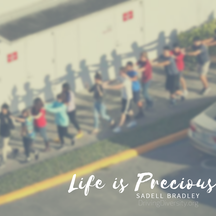 In light of recent events from last week, we wanted to share Rev. Sadell Bradley's blog on the importance of teaching our younger generation how precious and sacred life is. http://gracenotesbysadell.blogspot.com/2018/02/wednesdays-word-on-thursday-precious.html 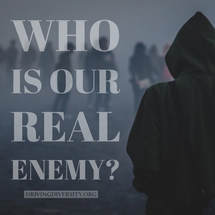 Recently, I have been reading a book called “Satan and His Kingdom” by Dennis McCallum. In one of the chapters, something hit me while I was reading. He talked about how Satan keeps us from taking territory for the Kingdom through distractions. He then gave an example about how Christians spent years--lots of money and energy--on prohibition (politicking to get alcohol considered illegal). This really did not do anything but produce anger toward Christians. “What does that have to do with diversity?” Well, I’m glad you asked. For the past couple of months some NFL players have been protesting the American Flag because of police brutality toward African Americans. While there should be a Gospel centered response from the Church, the idol of patriotism has reared its ugly head once again. I truly believe the devil is using this to target God’s church in order to divide us and keep us from what matters most and what matters to Jesus: the souls of people. Is Jesus using this situation to show where our hearts are really at? Does Jesus care about our patriotism? Yes, I believe He does. If anything, I believe it shows where our heart truly lies: with Him and His Kingdom or with our country of origin and our nationality. I know that this may sting, but let me challenge something. As a black man, I had to have a come to Jesus moment and choose which was more important, being black or being part of God’s kingdom. I had to “die to myself” and release my identity to join God’s kingdom and become His son. I’m not saying I had to give up my heritage or give up being proud of where I came from. What I mean is this: being black comes second to being part of His Kingdom. The same thing should go for pride in our nationality. The love of country and pride in our people should only come second to being part of the Family of God. Sure, we can be proud to be American, but being American should not supersede being a child of God and being part of His Kingdom. Our love of culture and country are offensive to Jesus if He does not come first. As God’s people, we need to reorient our lives around His purposes and His vision for His Kingdom. Here is how we can do this in light of social justice issues:
As God’s body, we should be “loving our neighbor as ourselves”, be “quick to listen and slow to speak”, and demonstrate fruits of the Spirit like love, peace, patience, kindness, and self-control. These things should rule our interactions with people, especially on hot topics like the NFL kneeling at the flag controversy. How can we claim to be fully part of God’s Kingdom if we do not allow his loving law to take priority control over our hearts, minds and actions? 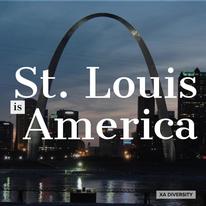 You have probably heard about the protests and the ongoing unrest that has erupted yet again in St. Louis. If you have not, then it is likely because you have, like many, grown so frustrated with racial issues in the U.S. that you have decided to drown it out or ignore it. Living here in St. Louis makes it hard to ignore, and more importantly, ignoring it is actually the problem. When I moved to St. Louis from Cincinnati, Ohio I heard that there was a significant racial divide here based on statics and the racial demographics of the city. There is a street called Delmar that almost divides the city in half, North and South. This street has acted as a proverbial railroad track for the city, as 95% of the African American population of the city lives north of these “railroad tracks”. I know, it almost seems impossible, but once you live here you not only come to recognize it as being true, you can also visually see the historic effect of this “railroad track” divide. South of Delmar, the city has continued to develop with businesses and new construction happening. You see early 20th century million dollar brick homes surrounding the historic Forest Park along with the History Museum, Science Center, Washington University and St. Louis Zoo. It is the place to live and be when you want to engage with what's new and great about the city. However, literally two city blocks north of this icon of wealth is the polar opposite. There is vacant lot after vacant lot and burnt out and abandoned homes. You can see the same large 20th century brick homes that decorate the neighborhood south of Delmar, only these homes are boarded up, abandoned and in disrepair. It is almost as though 75 years ago someone drew a line down Delmar Blvd and said all development money will go south of this line and nothing will happen north. The wealth, which at the time was 100% connected to race, will move south and leave the poor, which all but a few African Americans were at the time, will stay to the north. And so it has been done! When I arrived, I found it hard to believe that no one, Black or White was talking about this blatant racial disparity. Is it as though the battle was fought, and people had decided it was better to ignore rather than deal with this issue. Which brings us to the protests that continue to happen in St. Louis today. The shooting of Mike Brown and the acquittal of Jason Shockley has forced Black people in St. Louis out of silence. The unspoken agreement that was held before these events has been broken and now the protests are the icebreaker to the conversation that has to happen. And the protests and civil disruption will continue to happen until the conversations begin. I think St. Louis is a microcosm of America. In almost every city there is a Delmar divide that has been created by historical inequality. And for a while everyone agreed to not talk about it because some progress had been made. But with the 2016 election of Donald Trump and his openly racist remarks and immoral behavior, the unspoken agreement has been broken and now the protests are breaking the ice for the upcoming conversations that need to happen. Just as NFL players protest during the national anthem or university students refuse to have people speak at their graduation, the protests will continue until the conversations begin. So let’s talk! 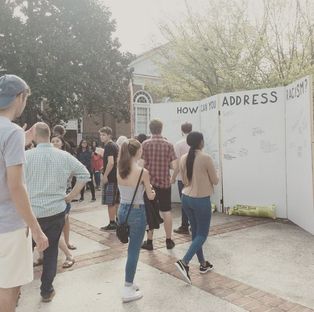 "Blood and soil," they chanted, invoking racist Nazi rhetoric of the past. With what appeared to be a fire of hatred in their eyes, these White Nationalists marched the Grounds of our University and our city seeking to instill fear. They came in hundreds. They came with guns. They came with torches. How can one respond to such blatant hate, especially when it hits so close to home? Jesus said his followers are the light of the world, a city on a hill that cannot be hidden (Matt. 5:14). As campus ministers at the University of Virginia, we had to think about what carrying this "light" would mean for us. How would we bear the torch of God’s fire for the world? So we came with prayer. In the aftermath of the violence on our campus and city, we decided to host a prayer walk along the same path the White Supremacists took at our university. We prayed for the reconciliation, healing, love, and truth of God to reclaim what the enemy sought to steal. At various locations, we stopped and prayed out loud specific prayers for God to intervene at UVA. Many of our students and members from other ministries joined us in a moment of Christian solidarity. We came with conversations. As the forces of darkness sought to build a wall of division between people, we built a conversation wall, literally. It stood all of 8 feet tall and 12 feet wide. Across the top, where everyone could read, we wrote: “How can you address racism?” In just three hours, the wall filled with hundreds of written responses from students of diverse backgrounds expressing their frustrations, solutions, and hopes. We engaged these students with gospel-centered conversations, offering Jesus as the solution to a world in division. It was the boldest question we’ve ever asked publically at our university, but sometimes we need our strategies to match up against what we’re fighting. We came with attentive ears. “Christians, especially ministers, so often think they must always contribute something when they are in the company of others, that this is the one service they have to render,” Bonhoeffer writes in Life Together. How many times have we been quick to speak, to assume, or to overlook because we fail to intentionally listen? During this time of heightened racial tension in our country, I’ve discovered how humbling and instructive it is to engage with the experiences of our ethnic minority students. We learn a great deal when we take the time to see our world through a different lens. Take Bonhoeffer’s advice: “listening can be a greater service than speaking.” The task is far from over, and let’s be humble enough to admit we don’t always get things right. It is out of our necessity that we turn to our God for courage, peace, and wisdom as we seek to carry his torch of reconciliation. No matter what campus you find yourself in, it is such a strategic time to be on university campuses. We all, as campus ministers, have so much exciting work to do! In Christ, we have the answer for what our country and the world is yearning for-- the ministry of reconciliation. Let us labor with love and unity to be His ambassadors on our campus. As you process what all this means for you and your specific university campus, I encourage you to pray. Pray for the connections your students are making on your campus Pray for those on your campus who are hurting, angry, or fearful. Pray for unity in the community of believers at our universities. Together, as the body of Christ, we can make His light shine like a city on a hill which cannot be hidden! Together we can persevere to continue reconciling students to Christ! Rigo Herrera Chi Alpha at the University of Virginia Flags as symbols can evoke feelings of loyalty and passion, and the Confederate flag certainly does this. While there are those who defend it, many today see it as a symbol of hate, while still another group neither defend it nor calls for its annihilation. But what should the citizens of God’s Kingdom think about it?
I offer five Biblical thoughts for members of Chi Alpha regarding the Confederate flag. I suggest we think through these five points and use them to judge ourselves and make sure that we are living out our vision of being a “movement of college-age men and women earnestly following Jesus.” What I have to say will be too much for some and too little for others. My desire is not to enter into a political conversation or even to offer my opinion, but to direct us to Biblical truths that have a bearing on this discussion. I invite you to prayerfully consider these: 1. DO MY ACTIONS GLORIFY GOD? So, whether you eat or drink, or whatever you do, do all to the glory of God (1 Cor. 10:31). If my brother or sister is offended by my actions, I am not bringing glory to God. If you ask an African American brother or sister if they are offended by the displaying of the Confederate flag the vast, vast majority will say, “yes”. If all truth were told, the flying of the Confederate flag from a vehicle often elicits fear in our African American brothers and sisters. The proud display of the Confederate flag sends a message to our African American brothers and sisters, whether intended or not, and the message is offensive. If we are knowingly offending our brothers and sisters in Christ we are not glorifying God. 2. GIVE UP YOUR RIGHTS Then he said to them all: “Whoever wants to be my disciple must deny themselves and take up their cross daily and follow me (Luke 9:23). Americans love to talk about their rights. Don’t get me wrong. I am very thankful for the liberties we experience in this country. My family, like all American families (except Native Americans), immigrated to the United States of America. We immigrated here primarily because of a lack of liberty in our home country. Liberty is something all believers can be thankful for, support, and work to preserve, but it is not something we can allow to shape our perspective. The truth is, as Christians, we have no rights. We have the privilege of worshiping Christ and participating in his mission. We are the salt of the earth. We are a city set on a hill. We are Christ’s ambassadors, as though God was making his appeal through us. In other words, we don’t represent ourselves, but our Father and the Lord Jesus Christ. We cannot glorify God if we do not first give up our rights, deny ourselves, pick up our cross, and follow him. Follow him. That’s just another way of saying “get on his side.” 3. EMBRACE SIMPLE TRUTHS So God created mankind in his own image, in the image of God he created them; male and female he created them (Gen 1:27). From one man he made all the nations (Acts 17:26). God’s perspective is clearly revealed in Scripture. Humanity is created in his image. We are sacred beings. Transgressing against any element of our sacred creation is sin. Racism in all forms from prejudice, to bigotry, to using our power to oppress or withhold opportunities from those we look down upon—is all sin. All nations (Greek ethnos, i.e. ethnic groups) are biologically related. We are not separate species, but one humanity. Anything or anyone who teaches contrary these simple truths are not teaching the gospel or the Bible. Here’s another simple truth that you may or may not like. One of the reasons the Confederacy was created to was preserve the owning of African slaves. Article I Section 9(4) of the Confederate Constitution states, “No bill of attainder, ex post facto law, or law denying or impairing the right of property in negro slaves shall be passed.” This is just one of several articles related to ensuring the enslavement of Africans continue in perpetuity. The flag that we commonly refer to the Confederate flag today was the second one adopted by the Confederacy was based on the battle flag that had become quite popular. To those held in slavery, this was most certainly a symbol of oppression, violence, helplessness, and an affirmation that they were subhuman. As a result of the Civil War the Confederate flag has almost always been displayed by those bent on intimidation or committing violence against African Americans. It is intrinsically linked to racism and white supremacy. From the Civil Rights movement to the Charlottesville marches, anyone spouting white supremacy, always seems to carry a Confederate flag. This is an association that cannot be denied. It is a simple truth. Neither white supremacy, black supremacy, nor Cuban supremacy is Biblical. The only supreme one for a Christian is Christ himself. The rest of us are all equal at the cross—equally lost and in need of redemption. Once we give up our rights and focus on glorifying God, it is much easier to embrace simple truths. 4. VALUE OTHERS ABOVE YOURSELVES Therefore if you have any encouragement from being united with Christ, if any comfort from his love, if any common sharing in the Spirit, if any tenderness and compassion, then make my joy complete by being like-minded, having the same love, being one in spirit and of one mind. Do nothing out of selfish ambition or vain conceit. Rather, in humility value others above yourselves, not looking to your own interests but each of you to the interests of the others. In your relationships with one another, have the same mindset as Christ Jesus: Who, being in very nature God, did not consider equality with God something to be used to his own advantage rather, he made himself nothing by taking the very nature of a servant, being made in human likeness. And being found in appearance as a man, he humbled himself by becoming obedient to death—even death on a cross! (Philippians 2:2-8). Even if I could distance the Confederate flag from its bloody history of violence, intimidation, and enslavement, there are millions in our country and in the Body of Christ who cannot. These descendants of slaves have grown up all their lives hearing the story of the struggle for freedom and those who violently opposed them, often under the protection of the law and with the affirmation of the church. I have heard first-hand from dear friends traumatic events they themselves experienced. Love is central to the Christian ethic. We cannot distance ourselves from the suffering of others, especially those within the body. So this flag cannot just be filed under, “everyone has the right to do what they want.” We must care, and our care should lead to action. The kind of action described in the Sermon on the Mount when it says, “blessed are the peacemakers, for they shall be called children of God.” Valuing others above ourselves requires dying to our rights, embracing simple truths, and choosing our Father’s glory. It means loving even those in error, but loving them enough to point out those errors. It means mourning with those who mourn and showing mercy to those who need it. It means engaging in justice, in a just way. It means being Christ’s ambassadors, not working our own agenda but his mission and living out the ethic of love at every turn. 5. BOAST IN THE LORD Therefore, as it is written: “Let the one who boasts boast in the Lord (I Corinthians 1:31). If someone else thinks they have reasons to put confidence in the flesh, I have more: circumcised on the eighth day, of the people of Israel, of the tribe of Benjamin, a Hebrew of Hebrews; in regard to the law, a Pharisee; as for zeal, persecuting the church; as for righteousness based on the law, faultless. But whatever were gains to me I now consider loss for the sake of Christ. What is more, I consider everything a loss because of the surpassing worth of knowing Christ Jesus my Lord, for whose sake I have lost all things. I consider them garbage that I may gain Christ (Philippians 3:4-8). In writing this blog post, I read a good bit about the flag and people’s feelings about it. Many claim it has been hijacked by racists and is really only a symbol of Southern pride. Remember, I am speaking here exclusively to followers of Christ. Let us not take pride in symbols of men but in the Lord. I love Paul’s words here in Philippians. He points to his ethnic heritage, his religious upbringing, and his zealous history, and then he says he considers them all loss for the sake of Christ. Notice how he shows the link between his ethnic pride and his religious zeal that led him to persecute the church. Pride and zeal are dangerous things. Better to boast in the Lord. Don’t get me wrong. I do not believe our ethnic distinctives are washed away at the cross. Paul continued to be a Hebrew and to live like one. He prayed fervently for his own people and worked to bring them the gospel, though his primary calling was to Gentiles. But he was cautious to not let his ethnic pride to get in the way of knowing Christ. I am a Cuban. I love being Cuban. I love the externals of my culture: the language, the food, the music. I love the internals: our love of fun, sense of humor, our generosity, and hospitality. I rejoice in the parts of my culture and heritage that bring glory to God, but am ashamed of those that don’t. We think too lightly of adultery. We worship idols, literally giving offerings of food to statues. We could be more meek and gentle. So while I love being who God made me, this is not where I boast. I boast in the Lord. I refuse to listen to adultery jokes (and we have a lot of them). They are not funny to God. He hates adultery. I have offended family members at refusing to hear their jokes, but I am more concerned about glorifying God. Recently I moved to the South and I am glad to say, there is much I love about it. There are a lot of gospel values in Southern culture. I like the community feel, the hospitality, and the ingenuity. There is much to love here. But none of these erase the terrible history of slavery, Jim Crow, or racism. These are not just part of Southern history, but American history. Identifying these as sinful and shameful is not rewriting history. It is admitting that history needs to be looked at honestly, and it’s ok to say this part was bad and we want to do it differently now. The church is not perfect. We do not and have not always done right. We cannot change the past, but we can change how we view it and the symbols it has left behind. We need to give up our rights, focus on bringing God’s glory, embrace simple truths, value others more than ourselves, and boast in the Lord. None of these are easily done, but all of them are in the business of citizens of God’s Kingdom. 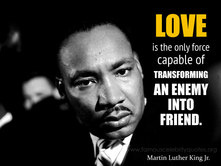 CHRISTIAN PRINCIPLES do not diminish in the face of ATROCITIES - extremely cruel acts, typically involving physical violence or injury- in fact, they intensify. The injustices and reprehensible behavior we have seen in the senseless executions of unarmed African-American men, AND in retaliation against innocent police have us all in shock, anger, disbelief and grief. However, holding the truths we believe, even at potential loss of life is what Christ followers around the world have exemplified for centuries. They believe steadfastly that Jesus is enough, and are armed with these truths:
"You have heard that it was said, 'Love your neighbor and hate your enemy.' But I tell you, love your enemies and pray for those who persecute you, that you may be children of your Father in heaven. He causes his sun to rise on the evil and the good, and sends rain on the righteous and the unrighteous. (Matt. 5:43-45) Jesus gives us a counter-cultural, no vengeance, yet winning strategy. "If you love those who love you, what credit is that to you? Even sinners love those who love them. And if you do good to those who are good to you, what credit is that to you? Even sinners do that. And if you lend to those from whom you expect repayment, what credit is that to you? Even sinners lend to sinners, expecting to be repaid in full. But love your enemies, do good to them, and lend to them without expecting to get anything back. Then your reward will be great, and you will be children of the Most High, because he is kind to the ungrateful and wicked. Be merciful, just as your Father is merciful. (Luke 6:32-36) I can hear the push back on this as I'm writing...but I didn't say it... I am an African-American woman with a husband, a son and two grandsons whose lives DEFINITELY matter to me! I also have friends whom I love in law enforcement, government and the military. I pray for their protection, and my emotions have swung the pendulum. Historically, I've marched and protested injustice more than the average person. I've also had more racial reconciliation discussions than most. When I devoted my life to Christ and was baptized, I began a NEW LIFE and immersed myself in Kingdom Culture. My first allegiance and priority (even over ethnicity, class or gender) is following Christ. (Gal. 3:28) In pressure-filled times like these, I might not like what the LORD directs me to do in His Word. Sometimes I rebel, or I'm hesitant to obey, but God's ways are ALWAYS right. Peacemakers who sow in peace reap a harvest of righteousness. (James 3:18)  Dale Stephens is a former missionary with Chi Alpha for 13 years (9 in Atlanta, GA) and currently serves as Pastor of Riverside Church in NW Atlanta. He and Andrea have three daughters, two goddaughters, and a dog. I was torn with emotions of awe and frustration as I watched Macklemore perform the closing song at the MTV Awards a few years ago. I was in awe as I watched him declare a passionate appeal of a prophetic type. He proclaimed in front of a large audience what he believes to be true, while also preaching a kind of vision of tomorrow for the world to believe in. For me, it was reminiscent of Martin Luther King Jr’s. “I Have A Dream” speech. I was torn with frustration as I empathetically knew he is proclaiming what millions resonated with, yet it was far from true peace and harmony. I couldn’t help but wonder who are the prophetic voices of the American church today for a Biblical vision of tomorrow. Was MLK an anomaly -- a once in a lifetime voice? Is God still prophetically proclaiming a gospel message for us all? Prophecy I was taught in my undergrad that prophecy operates in two possible definitions: 1. Forth-telling: proclamation of truth 2. Fore-telling: proclamation of future events For many of us, the term “prophecy” or “prophet” transports our minds to Old Testament passages. We unknowingly take a dispensational stance toward the terms. We mostly consider them for the ancient world. Prophets were those crazy types that seemingly ended with John the Baptist or Jesus. Prophets were the standouts who spoke against current culture. They were outsiders and rebels who had a streak of non-conformity. As a Pentecostal, there is a place for prophecy in our movement today. We acknowledge that God can use men and women to speak both fore-telling and forth-telling. In fact, in 1 Corinthians 12-14, Paul seems to gives a prioritization for prophecy. In the early days of the Pentecostal American experience, there was a strong emphasis on prophetic utterances. I have even seen a couple of prophets in my time. They too had a flare of “uniqueness”. The prophets and prophecy I have experienced have generally spoken to either individuals or churches. I wonder, why do we stop there? From Urgency to Emergency While in college, I worked at Bradley Memorial Hospital in the ER. In the ER, patients had to be identified as urgent or emergent. The label of “urgent” dictated the speed and effort by which a patient was received. “Emergent” received the highest level of effort, speediness, and care. As ministers, we have to see our world as emergent. Our communities and the individuals within, need life holistically today, tomorrow, and metaphysically. We live in a world of tension. We are progressing in our local society in many ways along racial needs. We see greater numbers of diversity all around us. Our country has progressed from recognizing individual human dignity to having key roles in government and society. Yet, entrenching along racial lines is happening. There are systemic and situational problems happening across our country. These are acts of injustice. As Christian Leaders, we have a responsibility to stand for justice. What will you do? Action The situation is emergent locally, nationally, and globally. We, as ministers, must proclaim prophetic truth. When I envision this kind of proclamation, I am envisioning modern day Moses, Isaiah, John, Jesus, and MLK. I picture men and women standing up for Biblically based truth, which will resonate and capture the world. I see pastors and missionaries leading the charge for the fullness of salvation rooted in eternal and earthly freedom. I am talking about being standouts not for the sake of self identifying with John the Baptist, but the kind of radical obedient Christ followers who recognize the time is now. Today, we must proclaim the fore-telling Truths of Scripture. We shall proclaim this Truth with a promise of a better life, community, and eternity for us all. Reconciliation is about Salvation...that all men, women, and children be found in shalom with God and His people. Prophetically Preach Preacher! Isaiah 19:19-25 In that day there will be an altar to the Lord in the heart of Egypt, and a monument to the Lord at its border. It will be a sign and witness to the Lord Almighty in the land of Egypt. When they cry out to the Lord because of their oppressors, he will send them a savior and defender, and he will rescue them. So the Lord will make himself known to the Egyptians, and in that day they will acknowledge the Lord. They will worship with sacrifices and grain offerings; they will make vows to the Lord and keep them. The Lord will strike Egypt with a plague; he will strike them and heal them. They will turn to the Lord, and he will respond to their pleas and heal them. In that day there will be a highway from Egypt to Assyria. The Assyrians will go to Egypt and the Egyptians to Assyria. The Egyptians and Assyrians will worship together. In that day Israel will be the third, along with Egypt and Assyria, a blessing on the earth. The Lord Almighty will bless them, saying, “Blessed be Egypt my people, Assyria my handiwork, and Israel my inheritance.” Follow Dale @atldrev or contact him via email at dale@riversideatlanta.church. 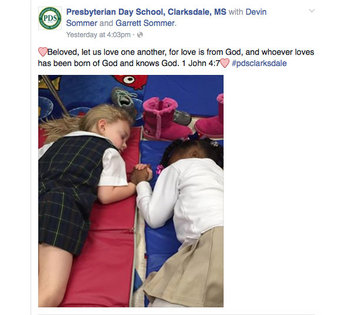 Have you seen this picture? It was shared by the Presbyterian Day School in Clarksdale, MS and has gone viral this past week. While some view it as a positive commentary on race relations, a representative with the school said they want the focus to remain on the love of Jesus Christ, as captioned in the picture. This brings up a vital question that, I think, as believers in Jesus, it is crucial that we ponder: What is going to improve race relations in our country? Is it just going to happen because as a society we are moving forward and the bigots and racist will eventually die out, or do we actually have to do something to bring it about? Recently, when I taught on God’s kingdom and the responsibility of the church to live according to its values, a kind older gentlemen asked me a version of this question. He shared what he saw in his neighborhood: scenes like those captured in the photo, children of different races playing together, which were non-existent in his youth. He asked me if I didn’t think things would just keep getting better and better until the day racial issues would simply disappear. His question implied that we need not bother ourselves with actively working against such issues, we need only wait. That’s the question isn’t it? Are things such as institutional racism, bigotry, and hatred simply going to disappear? Are we improving as a society? Will the world of Star Trek one day become reality? It is true we no longer have slavery and legalized segregation. But let’s remember how those changes came about. They did not happen because society simply improved. They were paid with the sacrifice and lives of thousands of people. They were fought for and, sometimes, wrenched from the hands of those who were holding on to them with radical fervency. The bigger question is whether the Christian worldview is one of a progressive future or one that calls for individual and societal responsibility? Well, when you put it that way, the answer is very clear isn’t it. Jesus himself spoke of the future, not as a utopia, but as a time when “the love of many would wax cold” and the world would be filled with ethnic strife, nation rising up against nation. As Christians we are called to “seek first his kingdom and His righteousness”. In other words, we are called to desire and pursue God’s authority in this world and his way of doing things. I think we can see in this a call to work for justice and equity. Not to bring about a utopia here on the earth, but to testify to the character of the God we serve. It’s funny to me that we conservative, Evangelical Christians are all about personal responsibility when it comes to most issues. There are many among us who see poverty, for example, primarily a result of personal choices and not a consequence of larger societal issues. Yet, when it comes to racial issues, we are tempted to put our trust in society and abdicate our own accountability in the matter. Could it be we are quick to blame but slow to work? Brothers and sisters, this should not be. Those of us who are called, literally by Christ's title — anointed one — should be the ones on the front lines of manifesting Christ’s love, heart, and character to the world around us. So I agree with the Presbyterian Day School, the picture is all about the love of Christ, for only His love lived out in real action can heal the racial wounds in individual hearts and in our society as a whole. This is the kingdom of God. |
Categories
All
Contributing Authors
|

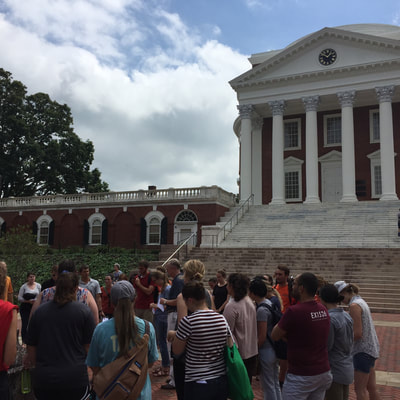
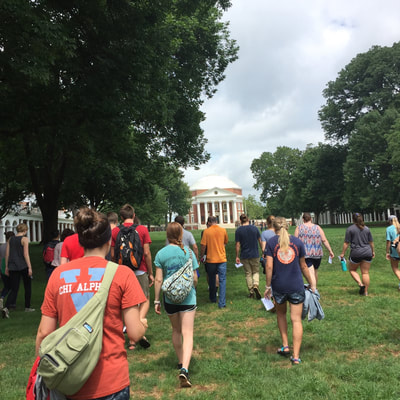
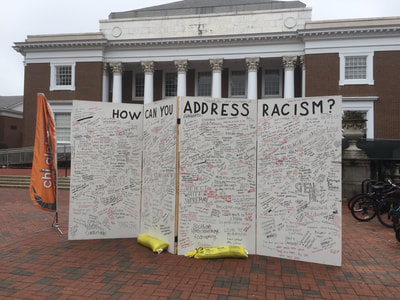
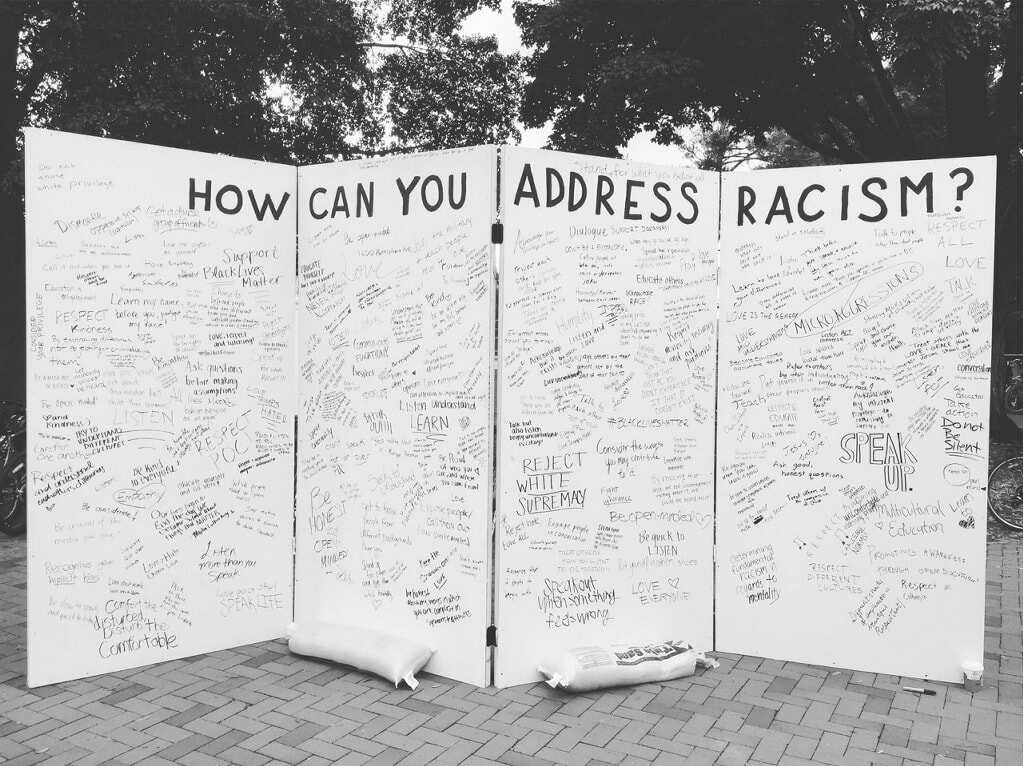

 RSS Feed
RSS Feed